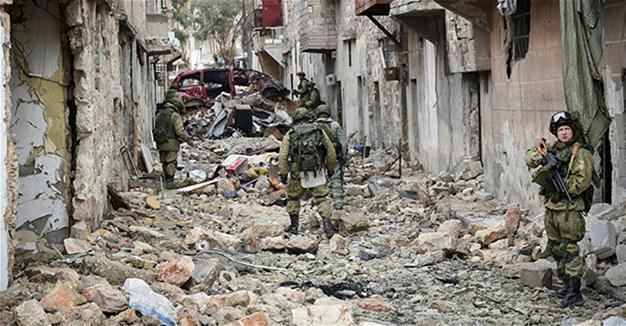Turkey and Russia to set up checkpoints in Syria for monitoring ceasefire
Sevil Erkuş - ANKARA
 Turkey and Russia, as the guarantors of a ceasefire deal between the Syrian regime and opposition groups, will establish checkpoints in Syria in order to monitor the truce and possible violations.
Turkey and Russia, as the guarantors of a ceasefire deal between the Syrian regime and opposition groups, will establish checkpoints in Syria in order to monitor the truce and possible violations.The Hürriyet Daily News has obtained the ceasefire document, which provides details of a mechanism for monitoring the ceasefire and a schedule for the planned peace negotiations.
In order to record violations to the ceasefire, “the guarantors will establish checkpoints in residential areas in the vicinity of the actual line of contact among the parties in order to guarantee compliance with the ceasefire by the parties,” read the agreement dated on Dec. 29.
A Turkish official also confirmed to the Daily News that Turkish and Russian officials will be located in different regions of Syria for truce monitoring activities.
Turkey and Russia will establish joint monitoring centers to closely follow the implementation of a ceasefire between the Syrian regime and the opposition groups, another Turkish official earlier told the Daily News, adding that the former will use its Eskişehir Main Air Base and the latter its Hmeimim Air Base in Syria to this end.
Joint commission to consider ceasefire violations
According to the agreement “on the mechanism to record violations of the ceasefire regime declared in Syria,” the guarantors will establish a Joint Commission that will “serve as the main body to consider all complaints and issues related to violations of the ceasefire regime.”
The Joint Commission will administer the activities of checkpoints to monitor compliance with the ceasefire regime by parties to the Syrian crisis. The Russian and Turkish offices of the Joint Commission will be located in Moscow and Ankara respectively, and guarantors will establish a direct communication channel between the offices.
The Joint Commission will “submit proposals to the parties to hold to account persons guilty of violating the ceasefire regime, and will also submit proposals to the guarantors on imposing sanctions on violating parties,” read the document.
Turkey and Russia will undertake all possible measures to resolve differences between the parties of the deal on compliance with the ceasefire regime and the resolution of conflicts between them.
If the parties fail to reach an agreement, “the Joint Commission will send to the violating party a demand to cease the violations and to take measures to compensate the affected party for harm inflicted on its population and infrastructure,” the document states, noting that if the demand is not complied with, Turkey and Russia will apply “enforcement measures to the violating party.”
Russian-Turkish officials to meet in early January
Turkey and Russia have also agreed to draft and sign an expanded version of this agreement that will elaborate on its provisions, according to the document. Experts from Ankara and Moscow will hold talks on Jan. 8 or Jan. 9 for coordination regarding the ceasefire deal and planned Astana talks.
Another agreement on “establishing delegations to launch negotiations on a political settlement aimed at a comprehensive resolution of the Syrian crisis by peaceful means,” a delegation formed by the Syrian government will begin joint work with the delegation of the opposing side on Jan. 15, which will take place in the city of Astana with the participation of the United Nations.
“This Agreement will enter into force at the time of signature by the plenipotentiary representative of the Government of the Syrian Arab Republic and will become legally binding provided that an agreement with similar contents to this Agreement is signed by representatives of the opposing side, with the participation of the Russian Federation,” said the document.
Monitoring centers activated
Two centers for monitoring nationwide ceasefire in Syria have been established in Ankara and Moscow, a Turkish official told the Hürriyet Daily News. Turkey and Russia have been in contact through these offices regarding the truce, the official added.
Both Turkey and Russia “have their own sources from the region and information gathered from these sources are processed at these centers,” the official stated.
















